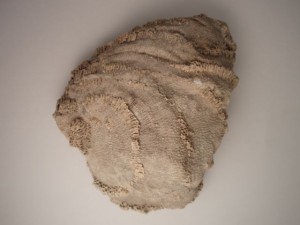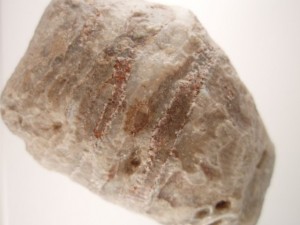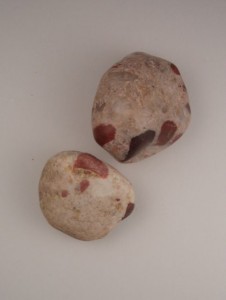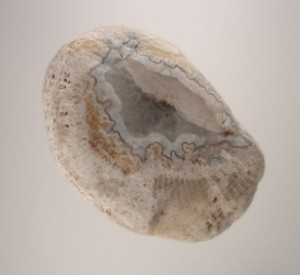
This is not the Favosite I donated to the Seaman Mineral Museum, but is a museum grade "feathery" fossil.
At our Grand Traverse Area Rock & Mineral Club meeting recently we had a request from someone coming to the area. He wanted information about hunting stones in this area, and about the geology. Because of glacial activity, we have an interesting mix of stone here. I will write about my rock hunt recently, because of the unusual specimens I found. I sometimes hunt in a private gravel pit, and often find really odd things that the glaciers have dragged down.
Our area is famous for the Petoskey Stones, of course, but other fossils include, Favosites, Horn Corals, Brachiopods, many other Devonian corals. Many other fossils from the Devonian Period as well as the Silurian Period appear.
Most of the Devonian fossils are calcified, but prior fossils can be the same species and are silica replacement. I love this one particular gravel pit because you never know what you will find. Once you think you have found everything, something else appears.
One time I found a fantastic Favosite specimen, so delicate I do not know how it servived 300 million years without deteriorating. The only thing I can think of is it ended up under a large boulder that protected it from water damage. Our area is primarily sand, so drainage is great. Normally the Favosites I get are round and glacial tumbled, but this particular specimen had much of its delicate structure intact. This particular specimen was donated to the A E Seaman Mineral Museum in Houghton, and can be enjoyed there.

A large Horn Coral about 7" long.
The first thing I found the other day was the largest horn coral I have ever found in the area. Into the bucket it went! The second specimen was another horn coral that was silica and contained a banded agate. I have never found anything like this and I have been hunting this location for a decade at least. What a delight to turn over a horn coral and see a fortification agate inclusion.
I also found a piece of Kona Dolomite of the Verde Antique variety, a lovely green Dolomite with lines of white similar to what you might see in Marble. I was amazed that this soft material survived a glacial push from the Marquette area.
I have also found Datolite and copper-included rocks at this gravel pit in the past. These were carried from the Keweenaw Peninsula. Pudding Stones are also not uncommon, and these came from the Sudbury, Ontario area. I found only one on this particular rock hunt, but it was a beauty.

Pudding Stones can be quite large. These are just babies!
Pudding Stones are red jasper and other igneous pebbles that have been “stirred” around in a white quartz matrix. The quartz is generally slightly porous and is difficult to obtain a high shine on it. These Pudding Stones on occasion contain banded agates.
People often ask me where they can find Petoskey stones, and although I do not often give away my secret spots, or areas on private property where I exclusively have permission to hunt, I can readily state IF it rains the finest Petoskey stones can be found on the back roads. Just find a dirt road and look, especially on the edge. Look in the road cuts, and washed out areas also. I guarantee you will find some nice stuff. I have seldom hunted Petoskey stones on the beach in recent years. The gravel pit stones are so much nicer. Stones from the roads have clearer patterns, and are generally much nicer. You may even find the rare pink Petoskey Stone if you are lucky. Let me know if this was a valuable tip for you.

My prize of the day was a fortification agate in a fossil. The first one I have found in 15 years from our area.
The beach rocks get really picked over so in general they are not as pristine as road rocks. Road rocks, on the other hand, are not picked over. Also the road commissions plow when the roads are wet. If you get lucky and find a freshly plowed and washed road, you can find a bucket of stones in short order.
Don’t just look in the Petoskey area. Spread out. Find someplace where no one has hunted. This is the best tip I can give anyone. Enjoy your hunting!







